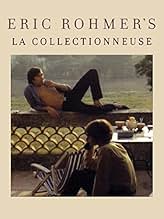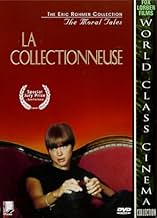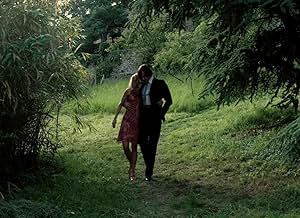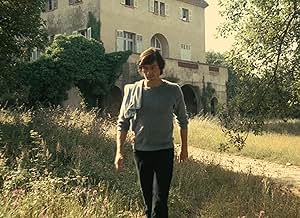AVALIAÇÃO DA IMDb
7,3/10
10 mil
SUA AVALIAÇÃO
Um negociante de arte mulherengo e um pintor, encontram a serenidade de suas férias perturbadas por uma terceira convidada, uma mulher boêmia conhecida por sua longa lista de conquistas masc... Ler tudoUm negociante de arte mulherengo e um pintor, encontram a serenidade de suas férias perturbadas por uma terceira convidada, uma mulher boêmia conhecida por sua longa lista de conquistas masculinas.Um negociante de arte mulherengo e um pintor, encontram a serenidade de suas férias perturbadas por uma terceira convidada, uma mulher boêmia conhecida por sua longa lista de conquistas masculinas.
- Direção
- Roteiristas
- Artistas
- Prêmios
- 2 vitórias e 1 indicação no total
Mijanou Bardot
- Carole
- (as Mijanou)
Eugene Archer
- Sam
- (não creditado)
Brian Belshaw
- Haydée's boyfriend
- (não creditado)
Pierre-Richard Bré
- Homme dans l'auto
- (não creditado)
Donald Cammell
- Garçon à St-Tropez
- (não creditado)
Alfred de Graff
- Touriste perdu
- (não creditado)
Avaliações em destaque
The first feature length moral tale, La Collectionneuse is easily better than its predecessors. Offering a realistic look into the lives of three young people and narrated perfectly by one, La Collectionneuse is a beautiful film. This is Eric Rohmer's first color feature and it is absolutely magnificent to look at. There are several gorgeous beach scenes. The cinematography all around is just glorious. Aside from that, the acting is wonderful. There is so much chemistry between the main characters that it electrifies the film. It also provides a realistic tale of the struggle to keep morality. Translated as "The Collector" in English, La Collectionneuse is an overlooked, underrated film that should be considered a classic.
The story begins with three prologues. The first, Haydee's prologue, simply shows the girl on the beach in a skimpy bikini. The second prologue introduces the viewer to Daniel, a painter, who becomes a key character. Adrien's prologue, the third and last, gives us an introduction to Adrien, who becomes our narrator throughout the rest of the film. These three characters are whom the story revolves around. Sharing a mutual friend, the three of them come to share a villa during their vacation. Adrien, an art dealer who is played by Patrick Bauchau, has made it his goal to do absolutely nothing during his stay. He and Daniel (Daniel Pommereulle) become friends fairly quickly, but both keep their distance from Haydee (Haydee Politoff), the beautiful young girl who beds a different guy every night. Adrien is at first disgusted with her behavior, calling her a "collector" of men, but eventually becomes intrigued by her. As he grows more and more attracted to her, Adrien must decide whether or not to sleep with her and forget his moral integrity or to abstain and do what he knows is right. Through his narration, Adrien debates this and plays mind games with Haydee, although he's not sure if she shares the attraction or if she simply wants to add him to her collection.
This film is simply beautiful. The sexual tension feels very real, which is due to both the performances of the actors and the direction of Eric Rohmer, who is quickly becoming one of my favorite directors. The narration is refreshing, offering a good look into Adrien's mind. La Collectionneuse is very sharp with its dialogue and themes. Like the other Rohmer films I've seen, this one ends very abruptly. It reminds us that we're watching these people's lives for only a short time. The 87 minutes is completely worth it, though. La Collectionneuse is a great film and should be regarded in higher esteem than it seems to be. I can't imagine why this one isn't ranked alongside the greats.
10/10
The story begins with three prologues. The first, Haydee's prologue, simply shows the girl on the beach in a skimpy bikini. The second prologue introduces the viewer to Daniel, a painter, who becomes a key character. Adrien's prologue, the third and last, gives us an introduction to Adrien, who becomes our narrator throughout the rest of the film. These three characters are whom the story revolves around. Sharing a mutual friend, the three of them come to share a villa during their vacation. Adrien, an art dealer who is played by Patrick Bauchau, has made it his goal to do absolutely nothing during his stay. He and Daniel (Daniel Pommereulle) become friends fairly quickly, but both keep their distance from Haydee (Haydee Politoff), the beautiful young girl who beds a different guy every night. Adrien is at first disgusted with her behavior, calling her a "collector" of men, but eventually becomes intrigued by her. As he grows more and more attracted to her, Adrien must decide whether or not to sleep with her and forget his moral integrity or to abstain and do what he knows is right. Through his narration, Adrien debates this and plays mind games with Haydee, although he's not sure if she shares the attraction or if she simply wants to add him to her collection.
This film is simply beautiful. The sexual tension feels very real, which is due to both the performances of the actors and the direction of Eric Rohmer, who is quickly becoming one of my favorite directors. The narration is refreshing, offering a good look into Adrien's mind. La Collectionneuse is very sharp with its dialogue and themes. Like the other Rohmer films I've seen, this one ends very abruptly. It reminds us that we're watching these people's lives for only a short time. The 87 minutes is completely worth it, though. La Collectionneuse is a great film and should be regarded in higher esteem than it seems to be. I can't imagine why this one isn't ranked alongside the greats.
10/10
"La Collectionneuse", the third film in Eric Rohmer's six moral tales, is packed with lacerating observations on life, love, and the nature of man. It is a sensitive conversation piece with elegant people commenting poetically on their lives and of those around them. Attractive men and women who reflect openly about the conflicts of intellect and impulse; inclination and action, solitude and companionship. Rohmer characteristically paces this eloquent tale of sexual temptation with long, fluid takes. "La Collectionneuse(Collector Girl) centers around a young, hedonistic girl(Haydee) who saunters laconically around the provincial environs of a large vacation home, seemingly indifferent to the two older men's(Adrian and Danele) existence. Haydee exudes a casual independence and an unflappable reserve. Her cursory dealings with her young lovers prompts Danele to cast her as 'the atrocious ingenue'. Though they find her unexpectedly alluring, both men regard 'the idea of collecting boyfriends opposite of purity'. Rohmer, the director of "Chloe in the Afternoon" and "A Tale of Springtime", enjoys revealing which individual can best cast their charm and guile to their best advantage. This 'game' between the sexes only leads to unwanted desires for the men and a resumption of her search by Haydee. Rohmer handles the material with a light touch throughout and concludes his story by offering a tenuous solution to the prevailing tension in the movie between one's solitude and fraternity. Adrian privately confesses that 'I was overwhelmed by a feeling of delightful independence, of total self-determination. But in the emptiness and silence of the house, I was overcome with anguish'. A universal truth clearly-rendered by one of cinema's most ingenious and graceful filmmakers.
The arrogant and pretentious intellectual art dealer Adrien (Patrick Bauchau) invites his girlfriend to travel with him to the coast to spend one month vacation with his close friend and painter Daniel (Daniel Pommereulle) in the house of their Randolphe. Adrien expects to do nothing but read and rest in the house and meet a possible investor in an art gallery that he dreams on having; however she prefers to travel to London. When he arrives, he discovers that the sexy and promiscuous pleasure-seeking Haydee (Haydée Politoff) that had one nightstand with Randolphe is sharing the house with Daniel. Along the days, Adrien becomes obsessed in a sick game of humiliating Haydee and imaging that she is trying to seduce him; however, his lust for her increases but his moral rationalization of their possible relationship keeps them apart.
"La Collectionneuse" is an erotic tale of arrogance, false value judgment and pretentious intellectuality of a false moralist. The witty and cynical screenplay uses excessive narrative in off of the unlikable lead character Adrien that is despicable as well as his friend Daniel. Actually, the only likable character is the libertine Haydee that accepts passively the cruel comments and treatment of Adrien and Daniel. Eric Rohmer uses the successful idea of a triangle of love with two men and a woman of "Jules et Jim" in a different and monotonous approach. My vote is six.
Title (Brazil): "A Colecionadora" ("The Female Collector")
"La Collectionneuse" is an erotic tale of arrogance, false value judgment and pretentious intellectuality of a false moralist. The witty and cynical screenplay uses excessive narrative in off of the unlikable lead character Adrien that is despicable as well as his friend Daniel. Actually, the only likable character is the libertine Haydee that accepts passively the cruel comments and treatment of Adrien and Daniel. Eric Rohmer uses the successful idea of a triangle of love with two men and a woman of "Jules et Jim" in a different and monotonous approach. My vote is six.
Title (Brazil): "A Colecionadora" ("The Female Collector")
Eric Rohmer's movies are, it seems almost without exception, slow- burners that reward those with the patience to sit through them, preferably more than once in some cases, and think about whats being said as much as whats being shown. This, his first feature in colour requires considerable thought on the part of the viewer, serving up nothing in the way of dramatic excitement and featuring three loathsome main characters who's morals are very in keeping with the era of late- 60s self satisfaction and hedonistic excess. Not that the hedonism is very wild. Jimi Hendrix does not blast from the simple record player that sits near a chair and provides the only music in the film. No one smokes anything illegal or pops any pills, talks of Indian mystics or goes in for meditation. But there is the very liberated (nowadays we'd say reckless) attitude to casual sex, although we don't see very much; the relaxed tangle of naked legs half glimpsed through one doorway, a brief an unrevealing shot of the main protagonist, the disturbingly young looking Haydee, quietly enjoying the intimate attention of another one-night-stand. Otherwise it's all hints and the more effective for that. Haydee is the very image of a swinging-sixties bed hopper. Young, slender, independent, cool and seemingly amoral she wrecks the plans of Adrian, an art dealer with time on his hands, when he finds her resident in a borrowed holiday villa at which he intends to devote himself to doing nothing at all for a few weeks while his girlfriend is in London. Haydee's noisy night-time frolics disturb his sleep and offend his self- declared sense of morality and the added presence in the house of his lazy, grumpy painter-friend Daniel sets up a spiralling tension between them all. But this is pure Rohmer and that tension manifests itself not in fist-fights, broken furniture, tearful confessions and blood-letting, but insults, low-key/nigh-brow arguments, teasing, sniping and political manoeuvring. In fact the more one thinks about the film, and it's one of those movies that does hang around long after the credits, the more one realises it's actually rather more like real-life, certainly as most of us endure it from time to time, than the over-dramatic offerings we are used to from mainstream movie-makers. Haydee maybe cute, Adrien describes himself as handsome and the setting is idyllic but you really wouldn't like to be on holiday with these unsympathetic characters. Observing their antics from without is one thing but to be part of it would be a nightmare! Oddly with it's morality so perfectly fixed in it's own time, this seems far more like a film from the 1970s. Something in it's look and after-the-party sense of deflation and disenchantment fits in with that later decade. Seeing it without knowing the release date you might well guess at 1972 or even later. If Godard's BANDE A PARTE is set in a Swinging-Sixties that hasn't yet arrived, Rohmer's film portrays one that has already left the building, although it's after-effects continue to create a problem. It all sounds somewhat depressing on paper and to some extent it is! It's not an easy film but if you give it time and maybe second look, you might well find there is more to this outwardly simple tale than you thought.
10totius
It's hard to explain what is the Rohmer's cinema. In his movies you can't find heroes, incredible adventures or great action sequences. Everything happens inside the mind of the characters, and the most important aspect is the psychology of them.
La Collectioneuse is simply the masterpiece of Rohmer.
The plot is very simple: two boys and one girl in their friend's house in St.Tropez. That's all. There are not incredible events that happen, they simply LIVE there. It's an typical situation of Rohmer who likes to study the evolution of love triangles, in different situations. The explanation of the development steps, made by the usual interior voice of the main character (Adrien), it's incredibly accurate and likely. It's fantastic that sometimes Adrien's thoughts look at first to be absurd, but even in this case if we reflect a bit to that we can realize that it's true, that really in similar cases we have non-sense thoughts like those. In this way, Rohmer is unique: the psycho-evolution of the characters is incredibly real. Dialogs, internal and not, are superb and the directing essential.
Rohmer shows us how it's possible to make a masterpiece with a ridiculous budget, and how an intellectual movie can be also enjoyable and not so heavy.
The vote, of course, can't be different by 10 out of 10.
La Collectioneuse is simply the masterpiece of Rohmer.
The plot is very simple: two boys and one girl in their friend's house in St.Tropez. That's all. There are not incredible events that happen, they simply LIVE there. It's an typical situation of Rohmer who likes to study the evolution of love triangles, in different situations. The explanation of the development steps, made by the usual interior voice of the main character (Adrien), it's incredibly accurate and likely. It's fantastic that sometimes Adrien's thoughts look at first to be absurd, but even in this case if we reflect a bit to that we can realize that it's true, that really in similar cases we have non-sense thoughts like those. In this way, Rohmer is unique: the psycho-evolution of the characters is incredibly real. Dialogs, internal and not, are superb and the directing essential.
Rohmer shows us how it's possible to make a masterpiece with a ridiculous budget, and how an intellectual movie can be also enjoyable and not so heavy.
The vote, of course, can't be different by 10 out of 10.
Você sabia?
- CuriosidadesÉric Rohmer's first color film.
- ConexõesFeatured in Uuden aallon jäljillä (2009)
Principais escolhas
Faça login para avaliar e ver a lista de recomendações personalizadas
- How long is The Collector?Fornecido pela Alexa
Detalhes
- Data de lançamento
- País de origem
- Central de atendimento oficial
- Idiomas
- Também conhecido como
- The Collector
- Locações de filme
- Côte d'Azur, França(coastal line and landscapes)
- Empresas de produção
- Consulte mais créditos da empresa na IMDbPro
Bilheteria
- Faturamento bruto mundial
- US$ 7.077
- Tempo de duração
- 1 h 26 min(86 min)
- Mixagem de som
- Proporção
- 1.37 : 1
Contribua para esta página
Sugerir uma alteração ou adicionar conteúdo ausente

![Assistir a Bande-annonce [OV]](https://m.media-amazon.com/images/M/MV5BMjA2ZGRjY2QtNmMzMy00MjE3LWI1YzUtZTZiZDQ5YzY0YWIxXkEyXkFqcGdeQXRyYW5zY29kZS13b3JrZmxvdw@@._V1_QL75_UX500_CR0)












